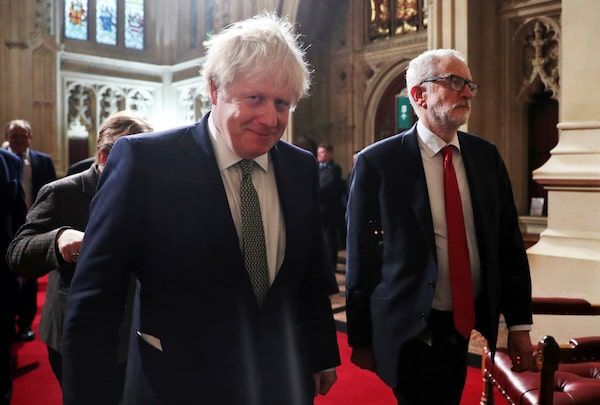
Prime Minister Boris Johnson, foreground, and Labour Party leader Jeremy Corbyn arrive for the State Opening of Parliament at the Houses of Parliament in London on Dec. 19, 2019.Hannah Mckay/The Associated Press
Willem H. Buiter, a former chief economist at Citigroup, is an adjunct professor at Columbia University.
Britain’s general election this month not only settled the question of Brexit, but also put paid to Labour Party Leader Jeremy Corbyn’s extreme vision of socialism. Mr. Corbyn’s electoral demise comes as a relief to all who reject the Venezuelan economic model: if it moves, regulate it; if it still moves, tax it; and if it’s still twitching after that, nationalize it. Britain has been spared a very costly five-year diversion. It is little wonder markets heaved a sigh of relief after the Tories’ overwhelming victory.
To be sure, Prime Minister Boris Johnson’s economic-policy program is also far removed from the pro-market, small-government tradition of Margaret Thatcher. His government will spend more, tax more, and pursue some populist-style interventions in markets and industries. Still, its approach will be nowhere near as radical as what Mr. Corbyn proposed.
Mr. Johnson now must carry out the Brexit he has long championed. The exit agreement with the European Union centers on four primary issues: Britain’s future financial contributions to the EU budget; the treatment of EU citizens in Britain and vice versa; Northern Ireland’s place in the EU customs union and single market; and the continuing jurisdiction of the European Court of Justice.
It is still unclear what type of trade, economic and political relationship will prevail between Britain and the EU after the transition period ends on Dec. 31, 2020. And Britain’s future trade relations with non-EU member states are equally uncertain. Despite Mr. Johnson’s emphatic assertions that the transition period will not be extended, his failure – at no political cost – to deliver his promise of an exit on Oct. 31, 2019, suggests all options remain on the table. After all, the political declaration that will accompany the withdrawal bill is merely aspirational, not legally binding. The real negotiations over the future EU-British relationship have not even begun (the first round is scheduled for March 1, 2020).
Most trade negotiations take years. The Comprehensive Economic and Trade Agreement (CETA) between the EU and Canada was signed on Oct. 30, 2016, after more than a decade of talks (if one dates the start of the process to the March, 2004, accord on a framework for a new Canada-EU Trade and Investment Enhancement Agreement). And although substantial parts of the CETA are being applied pending approval by all signatories, the agreement itself is still not in force.
Moreover, it is important to remember that tariffs and quotas are just the tip of the iceberg. There are many other visible and invisible barriers to trade, some legal and regulatory, others administrative, bureaucratic and political. Even in the absence of tariffs and quotas, trade can be impeded by subsidies, taxes, anti-dumping legislation, restrictions on foreign direct investment and exchange-rate manipulation.
For example, protectionism often masquerades as labour, food, environmental and phytosanitary standards, or as arguments for local content requirements, infant industries, protections for intellectual property, climate policies, dispute resolution or human rights. Human ingenuity appears to know no bounds when it comes to dreaming up protectionist barriers. In October, 1982, the French government required that all Japanese VCR imports enter the country through Poitiers, a town hundreds of miles from the nearest significant shipping port. This non-tariff barrier remained in effect until April, 1983.
But not only will Britain’s economic and political arrangements with the EU remain subject to pervasive uncertainty, its relationships with non-EU third countries will be negotiated from a position of weakness relative to the pre-Brexit EU, when it was part of a bloc of 28 states.
Some Brexiters think they can pull it off. But Mr. Johnson has no credible arguments to support his promise (or threat) to turn Britain into a deregulatory, low-tax haven. Mr. Johnson’s Toryism – a big-government, dirigiste, one-country strain of Toryism with populist overtones – rules out the “Singapore solution.” At most, such an approach might be attempted for the financial sector.
To that end, regulatory arbitrage could produce significant changes in the rules of the game for the investing and insurance industries, which are currently subject to the EU’s MiFID II and Solvency II frameworks, respectively. While the City of London will undoubtedly lose business to EU competitors, Britain could legislate and deregulate it into a position to attract new business from Europe and the wider global economy. As for key sectors like the car industry, I doubt that the prevailing taxation and regulatory regimes can be transformed in such a way as to ensure global competitiveness as soon as 2021.
Of the EU’s four quintessential freedoms, the end of the free movement of people will likely cause the most severe and lasting damage to the supply side of British economy. Again, it is possible, in principle, to mitigate most or even all of these costs through an enlightened, globally oriented immigration policy, along the lines of the Australian or Canadian models. The problem is that the post-Brexit political equilibrium in Britain is unlikely to generate an efficient, points-based immigration regime, let alone one that attracts talented foreign students.
Britain has avoided a Corbyn apocalypse. But it is still on track for a painful grind through many years of negotiations and policy implementation. Whether it can make the best of a bad Brexit remains to be seen.
Copyright: Project Syndicate, 2019. www.project-syndicate.org